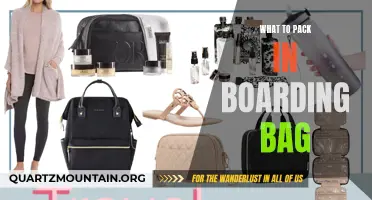
Are you preparing for the arrival of twins? Congratulations! With double the joy also comes double the responsibility, especially when it comes to packing a nappy bag. This essential item is your lifeline when you're out and about with your little ones, but knowing what to pack can be a challenge. In this article, we'll guide you through the essential items for twins, ensuring you're fully prepared for any situation that may arise while on the go. From nappies and wipes to extra clothes and snacks, we've got you covered. So grab your nappy bag and let's dive in!
What You'll Learn
- What are the essential items to pack in a nappy bag for twins?
- How many nappies should I pack for a day trip with twins?
- What are some must-have items for feeding twins on the go?
- Are there any specific items that are essential for twins' hygiene needs in a nappy bag?
- Should I pack separate sets of clothes and blankets for each twin in the nappy bag?

What are the essential items to pack in a nappy bag for twins?

When it comes to taking care of twins, being prepared is key. One essential item that every parent of twins needs is a well-stocked nappy bag. This bag is your lifeline when you're out and about with your little ones, so it's important to pack it with the right items to ensure a smooth and stress-free outing. In this article, we will discuss the essential items to pack in a nappy bag for twins, based on scientific research and parental experience.
- Nappies: The number one item you need to pack in your nappy bag is, of course, nappies. For twins, it's best to pack at least one nappy per hour that you plan to be out, plus a few extra. This way, you'll be prepared for any accidents or unexpected delays.
- Wipes: Along with nappies, wipes are a must-have item in your nappy bag. Opt for travel-sized packs or a reusable wipe case to save space. Make sure to pack enough wipes to last the duration of your outing, as you'll be using them for diaper changes, cleaning hands, and wiping surfaces.
- Changing pad: It's essential to have a portable changing pad in your nappy bag. This will provide a clean and comfortable surface for diaper changes, no matter where you are. Look for a foldable and washable pad that can easily fit into your bag.
- Diaper cream: To prevent and treat diaper rash, pack a small tube of diaper cream in your nappy bag. Look for a cream that is safe for sensitive skin and has soothing properties. Apply it at every diaper change to keep your twins' skin healthy and protected.
- Spare clothes: Accidents happen, especially with twins, so it's crucial to pack spare clothes for each child in your nappy bag. Include an extra outfit, socks, and a hat in case of spills, leaks, or weather changes.
- Blankets: Soft, lightweight blankets are versatile and useful in many situations. Use them for swaddling, creating a clean surface for tummy time, shading from the sun, or keeping your babies warm. Pack a couple of blankets in your nappy bag to cover all bases.
- Bottles and formula: If you're bottle-feeding your twins, don't forget to pack bottles and formula in your nappy bag. Opt for travel-sized formula containers or premix formula in travel-sized bottles to save space. Remember to bring enough water for preparing the formula on the go.
- Snacks and water: As your twins grow, it's important to have snacks and water readily available, especially for longer outings. Pack age-appropriate snacks such as finger foods, dried fruit, or cereal bars, along with sippy cups or bottles filled with water. This will help keep your little ones nourished and hydrated throughout the day.
- Pacifiers and teething toys: For soothing and distracting your twins, make sure to pack pacifiers and teething toys in your nappy bag. These items can provide comfort during diaper changes, feeding times, or when they need a little distraction.
- Medications and first aid essentials: If your twins have any specific medications or medical needs, don't forget to pack them in your nappy bag. Additionally, include a basic first aid kit with items such as band-aids, antiseptic wipes, and thermometer.
In summary, packing a well-stocked nappy bag for twins is essential for ensuring a smooth outing. By including items such as nappies, wipes, changing pad, spare clothes, blankets, bottles, formula, snacks, pacifiers, and first aid essentials, you'll be prepared for any situation that may arise. Remember to customize the contents of your nappy bag based on your twins' individual needs and preferences, and always check the bag before leaving to make sure everything is packed and ready to go.
Essential Items to Pack for Your Bora Bora Vacation
You may want to see also

How many nappies should I pack for a day trip with twins?

When planning a day trip with twins, it is essential to be well prepared, especially when it comes to packing supplies like nappies. Twins require double the amount of supplies compared to a single child, so it's important to calculate just how many nappies you should pack for your day trip. In this article, we will discuss a step-by-step approach to help you determine the right amount of nappies to bring along.
Step 1: Assess the duration of your day trip
To determine how many nappies you should pack, you need to consider the duration of your day trip. Typically, a day trip lasts around 6 to 8 hours. However, if you plan on being away for a longer period, you will need to adjust the number of nappies accordingly.
Step 2: Estimate the average number of nappy changes per hour
On average, newborns and infants may require a nappy change every 3 to 4 hours. For twins, this means you may need to change their nappies every 1.5 to 2 hours. However, keep in mind that every child is different, and some may require more frequent nappy changes, while others may require fewer.
Step 3: Multiply the number of nappy changes by the duration of the day trip
Based on the estimated number of nappy changes per hour, multiply this by the duration of your day trip. For example, if you expect to be away for 6 hours, and you estimate changing your twins' nappies every 1.5 hours, you would need around 4 nappy changes per twin. Multiply this by 2 (for twins), and you would need approximately 8 nappies for your trip.
Step 4: Add a couple of extra nappies for emergencies
It's always a good idea to pack a few extra nappies in case of unexpected delays or emergencies. Accidents can happen, and having extra nappies on hand will ensure you are prepared for any unforeseen circumstances.
Example:
Let's say you are planning a day trip to the zoo with your twins. You estimate that the trip will last around 6 hours. Based on the average number of nappy changes every 1.5 hours, you would need approximately 8 nappies per twin. Multiplying this by 2 (for twins) would give you a total of 16 nappies. To be on the safe side, you decide to pack an additional 2 nappies, bringing the total to 18.
In conclusion, when planning a day trip with twins, it's important to pack an adequate number of nappies. By assessing the duration of your trip, estimating the average number of nappy changes per hour, and factoring in a few extra nappies for emergencies, you can ensure that you are well-prepared for your day out with your little ones. Remember, every child is different, so it's crucial to remain flexible and adjust your nappy supply accordingly.
Ultimate Packing Guide for a Mediterranean Cruise in April
You may want to see also

What are some must-have items for feeding twins on the go?

When you have twins, feeding on the go can be quite a challenge. However, with the right items, you can make it a lot easier to feed your babies while traveling or running errands. Here are some must-have items for feeding twins on the go:
- Double Stroller: Investing in a double stroller is crucial for parents of twins. Look for a stroller that allows for easy maneuverability and has a built-in snack tray or cup holder. This way, you can feed your babies while on the move.
- Insulated Bottle Bag: An insulated bottle bag is essential for keeping bottles warm or cold while you're out and about. Look for a bag that can hold multiple bottles and has separate compartments to keep them organized. This will ensure that you always have a fresh bottle ready for each baby.
- Bottle Warmer: If you frequently travel long distances or spend a lot of time away from home, a portable bottle warmer is a lifesaver. These devices can quickly warm up a bottle using hot water or a heating element, making it easy to feed your babies on the go.
- Bibs and Burp Cloths: Feeding twins can be messy, so it's important to be prepared. Pack plenty of bibs and burp cloths to catch any spills or spit-up. Look for bibs with pockets to catch crumbs and drool, and choose burp cloths that are absorbent and easy to clean.
- Portable High Chairs: When you're eating out or visiting friends, having portable high chairs can make feeding your twins a breeze. Look for high chairs that are lightweight, foldable, and easy to clean. Some portable high chairs even come with attached trays, eliminating the need for additional surfaces to feed your babies.
- Snack Cups: As your twins grow, they will start to eat solid foods. Snack cups with lids are perfect for holding bite-sized snacks like cheerios, puffs, or cut-up fruit. Make sure to choose cups that are spill-proof and easy for little hands to hold.
- Nursing Cover: If you're breastfeeding, a nursing cover or scarf is a must-have item when feeding on the go. It provides privacy and allows you to nurse discreetly wherever you are. Look for covers that are lightweight, breathable, and easy to clean.
- Disposable Bibs and Utensils: For quick and easy clean-up, consider using disposable bibs and utensils. These items make feeding on the go much more convenient as you can simply toss them out after use. Look for bibs with adhesive strips that stick securely to your babies' clothes.
- Formula Dispenser: If you're using formula, a formula dispenser is essential for feeding twins on the go. These handy containers have separate compartments for pre-measured amounts of formula, allowing you to make a bottle quickly and easily. Look for dispensers that are compact and easy to use with one hand.
- Snack Pouches: As your twins get older, they will enjoy eating on their own. Snack pouches filled with purees or yogurt are a convenient and mess-free option for on-the-go snacking. Look for pouches that are BPA-free and easy to fill and clean.
In conclusion, feeding twins on the go can be challenging, but with the right items, it becomes much easier. A double stroller, insulated bottle bag, bottle warmer, bibs, burp cloths, portable high chairs, snack cups, nursing cover, disposable bibs and utensils, formula dispenser, and snack pouches are all must-have items for feeding twins while out and about. These items will help ensure that your babies are well-fed and comfortable no matter where you are.
Essential Items for a Celebrity Mediterranean Cruise: What to Pack Before Setting Sail
You may want to see also

Are there any specific items that are essential for twins' hygiene needs in a nappy bag?

When it comes to taking care of twins, having a well-stocked nappy bag is crucial. This bag will be your lifeline when you are out and about with your little ones, so it's important to make sure you have all the essentials for their hygiene needs. Here are some specific items that are essential for twins' hygiene needs in a nappy bag:
- Nappies: This is the most obvious item to have in your nappy bag. Make sure you pack enough nappies to last for the duration of your outing. For twins, it's best to calculate how many nappies they go through in a day and pack accordingly. It's always better to have a few extra nappies on hand, just in case.
- Wipes: A good supply of baby wipes is a must-have for twins. Wipes come in handy for cleaning bottoms, hands, and faces. Look for wipes that are gentle on sensitive skin and free of harsh chemicals. There are also wipes available specifically for sensitive skin, so consider those if your twins have any skin issues.
- Nappy cream: Twins are more prone to nappy rash due to the increased volume of dirty nappies. Having a nappy cream on hand can help prevent and soothe nappy rash. Look for a cream that is hypoallergenic and contains ingredients like zinc oxide or lanolin to provide a protective barrier for their delicate skin.
- Changing pad: Having a portable changing pad in your nappy bag is essential for on-the-go nappy changes. Twins require frequent nappy changes, so having a clean and comfortable surface to lay them on is important. Look for a changing pad that is easy to wipe clean and compact enough to fit in your bag.
- Hand sanitizer: Keeping your hands clean is crucial when you are dealing with twins' hygiene needs. Having a travel-sized hand sanitizer in your nappy bag can help you quickly clean your hands before and after nappy changes. Look for a sanitizer that is alcohol-based and kills germs effectively.
- Spare clothes: Twins can be messy, so having a change of clothes for each of them is essential. Accidents happen, and having spare clothes can save you from having to deal with a messy situation. Pack a complete set of clothes, including tops, bottoms, socks, and hats, in case you need to do a full outfit change.
- Disposable bags: Disposable bags are handy for storing dirty nappies, soiled clothes, or used wipes. Look for biodegradable bags that are eco-friendly and easy to seal. These bags will help contain any smells and keep your nappy bag clean and odor-free.
Remember to check your nappy bag regularly to ensure that you have all the essential items replenished. Twins require extra care and attention, so having a well-prepared nappy bag will make outings with them much more manageable. With the right supplies on hand, you can confidently take care of your twins' hygiene needs even when you are away from home.
Essential Packing Guide for Exploring the Beauty of the Boundary Waters
You may want to see also

Should I pack separate sets of clothes and blankets for each twin in the nappy bag?

As a parent of twins, it is essential to be prepared when leaving the house. One common question that arises is whether to pack separate sets of clothes and blankets for each twin in the nappy bag. This article will delve into the reasons why it may be beneficial to do so, as well as how to efficiently pack for twins.
Scientifically speaking, having separate sets of clothes and blankets for each twin can help prevent the spread of germs and infections. Twins often share close quarters, and what affects one twin can easily be passed on to the other. By keeping their belongings separate, parents can minimize the risk of cross-contamination and keep both twins healthy.
Furthermore, having separate sets of clothes and blankets can also make it easier to identify which twin each item belongs to. This is particularly important if the twins are not identical, as it can help avoid confusion and mix-ups. It is worth noting that even identical twins may have slight differences in appearance or preferences, making it beneficial to have individual sets of clothing and blankets.
Packing separate sets of clothes and blankets for each twin does not necessarily mean doubling the amount of items in the nappy bag. Here is a step-by-step guide on efficiently packing for twins:
- Start by organizing the items needed for each twin. This may include diapers, wipes, spare clothes, and blankets.
- Lay out the items for one twin, making sure to have a sufficient number of each item.
- Repeat the same process for the other twin, laying out their items separately.
- Once both sets of items are laid out, assess if there are any items that can be shared between the twins. For example, diapers and wipes can often be shared, reducing the overall number of items required.
- Pack each twin's items in separate compartments of the nappy bag. This will help keep everything organized and easily accessible.
- Consider labeling each twin's clothing and blankets to further avoid mix-ups. This can be done using name tags or colored ribbons.
- Remember to also include any necessary extras, such as bottles, pacifiers, or toys, in each twin's section of the nappy bag.
By following these steps, parents can efficiently pack separate sets of clothes and blankets for each twin without adding unnecessary bulk to the nappy bag.
To illustrate the benefits of packing separate sets of clothes and blankets, consider the following example:
Sarah and John are parents to twin boys, Michael and James. One day, Michael falls ill and develops a fever. Sarah immediately takes him to the doctor and ensures he is well taken care of. Thanks to having separate sets of clothes and blankets for each twin, James is less likely to catch the illness. Sarah can focus her attention on nursing Michael back to health without worrying about the well-being of James.
In conclusion, it is advisable to pack separate sets of clothes and blankets for each twin in the nappy bag. This practice can help prevent the spread of germs and infections, as well as avoid confusion and mix-ups between twins. Following an organized packing process can ensure efficiency without adding unnecessary bulk to the nappy bag. By prioritizing the individual needs of each twin, parents can provide the best care for their twins when out and about.
Essential Packing Guide for 4 Days in Iceland in October
You may want to see also
Frequently asked questions
When packing a nappy bag for twins, it's important to include double the amount of essentials. This means packing enough diapers, wipes, and changing pads for both babies. Additionally, pack extra clothes for each baby, as accidents and spills are common. You may also want to include a small blanket or swaddle for each baby to keep them comfortable.
It's a good idea to pack at least two bottles per baby in your nappy bag for twins. This way, you'll have enough for each baby's feeding needs while on the go. Don't forget to also pack enough formula or breast milk to prepare the bottles when needed.
As your twins get older and begin to eat solid foods, it's a good idea to pack some snacks in your nappy bag. This can be items like baby food pouches, crackers, or cut-up fruits and vegetables. Make sure to pack enough for both babies, and choose snacks that are easy to eat and not too messy.
It's always a good idea to have extra pacifiers on hand, especially when you have twins. Babies can easily drop or lose their pacifiers, so having extras in your nappy bag can be a lifesaver when one gets lost or dirty. Make sure to clean and sanitize the pacifiers regularly to keep them hygienic.
Including some small toys or entertainment items in your nappy bag can be helpful, especially for longer outings or trips. Pack a couple of small toys or books that are easy to clean and keep the babies engaged during diaper changes or times when they need to be distracted. Just be mindful of the size and noise level of the toys to ensure they are appropriate for the situation.







